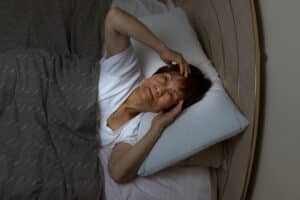Sleep Maintenance Insomnia: Could It Be Keeping Your Dad Up?
Sleep deprivation is a terrible thing. But, as we age, insomnia becomes a greater risk. Some scientists estimate that, past the age of about fifty, humans lose about twenty-seven minutes off their average nightly sleep every decade.
That means that many seniors in their late sixties, seventies, and eighties are routinely getting five or six hours of sleep a night.
We used to think that old people just didn’t “need” a lot of sleep. Now scientists assure us that eight hours of sleep are still needed at every age. Old people just aren’t getting enough sleep.
Causes of Sleep Deprivation in the Elderly

Home Health Care Havertown, PA: Sleep Maintenance Insomnia
Chronic medical conditions, including mental health disorders, often disrupt the sleep of the elderly. The older one gets, the greater the risk of developing a breathing disorder, like sleep apnea, or restless legs syndrome.
Many different medications can contribute to insomnia. Corticoid steroids, diuretics, high blood pressure medicine, and anticonvulsants are some of the most common sleep disruptors.
Sleep Cycle Alterations
The human sleep cycle consists of phases of light sleep, deep sleep when the eyes are at rest, and rapid eye movement (REM) sleep. The last stage is the dream state. As we age, the periods of deep and REM sleep get shorter and less frequent.
This means that people over sixty-five are getting more light sleep and less of the really refreshing kind of sleep that allows young people to bounce out of bed in the morning with a song in their hearts.
Waking Up Too Early
Some seniors have trouble staying asleep for a therapeutic amount of time. When one wakes up with only four or five hours sleep and can’t fall back asleep quickly, this is called “sleep maintenance insomnia.” Women are more prone to this disorder than men are.
A senior can be doing everything right, getting lots of exercise, avoiding caffeine, and not going to bed before she’s tired, and still wake up after four or five hours. While it’s okay to skimp on sleep for one or two nights, the toll of too many sleep-shorted nights can add up. The detriments of sleep deprivation, for everyone, are confusion, mental fog, and difficulty doing tasks that ought to be easy.
What helps?
To defeat insomnia, seniors need to avoid naps as much as possible, go to sleep at the same time and awake at the same time on a daily basis, and save the bedroom for sleep. In other words, insomniacs need to move the books and the television out of the bedroom. It’s also beneficial to avoid stimulating mental or physical activity for an hour before bedtime. Meditating sometimes helps with this.
If all non-pharmacological methods fail, a low dose of zolpidem, eszopiclone, or zaleplon could help your senior get a decent night’s sleep. Keep in mind that the elderly do not always get the same results from medications that younger people get.
Home health care aides can help your senior with sleep hygiene by encouraging the right behaviors, such as consistent routines, avoiding naps, and avoiding caffeine in the late afternoon, evening, and night. Home health care aides can also alert you if your parent is suffering from sleep deprivation.
In conclusion, the sleep of the elderly is more fragile than the sleep of the young. But developing steady habits and correct sleep routines can make a positive difference. Make sure your senior is sleeping at least eight hours a night, because sleep is critical to good quality of life.
If you or an aging loved one are considering Home Health Care in Havertown, PA please contact the caring staff at True Direct Home Health Care today.
Sources
https://www.health.harvard.edu/staying-healthy/too-early-to-get-up-too-late-to-get-back-to-sleep
- How Home Health Providers Offer Education Amidst Physical Health Changes - March 5, 2024
- Spring Activities for Seniors - February 21, 2024
- How to Help an Older Loved One with Cataracts? - February 6, 2024
